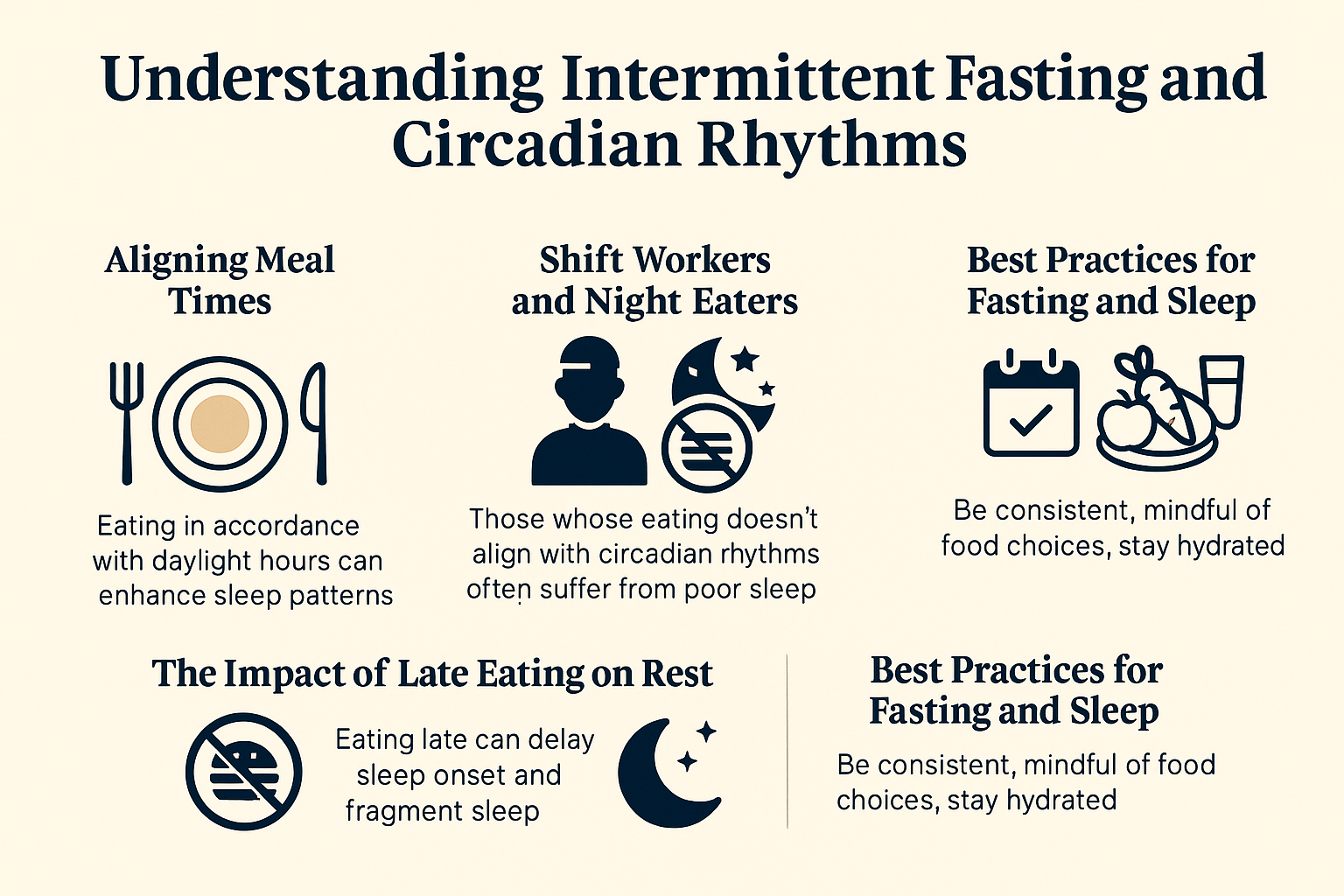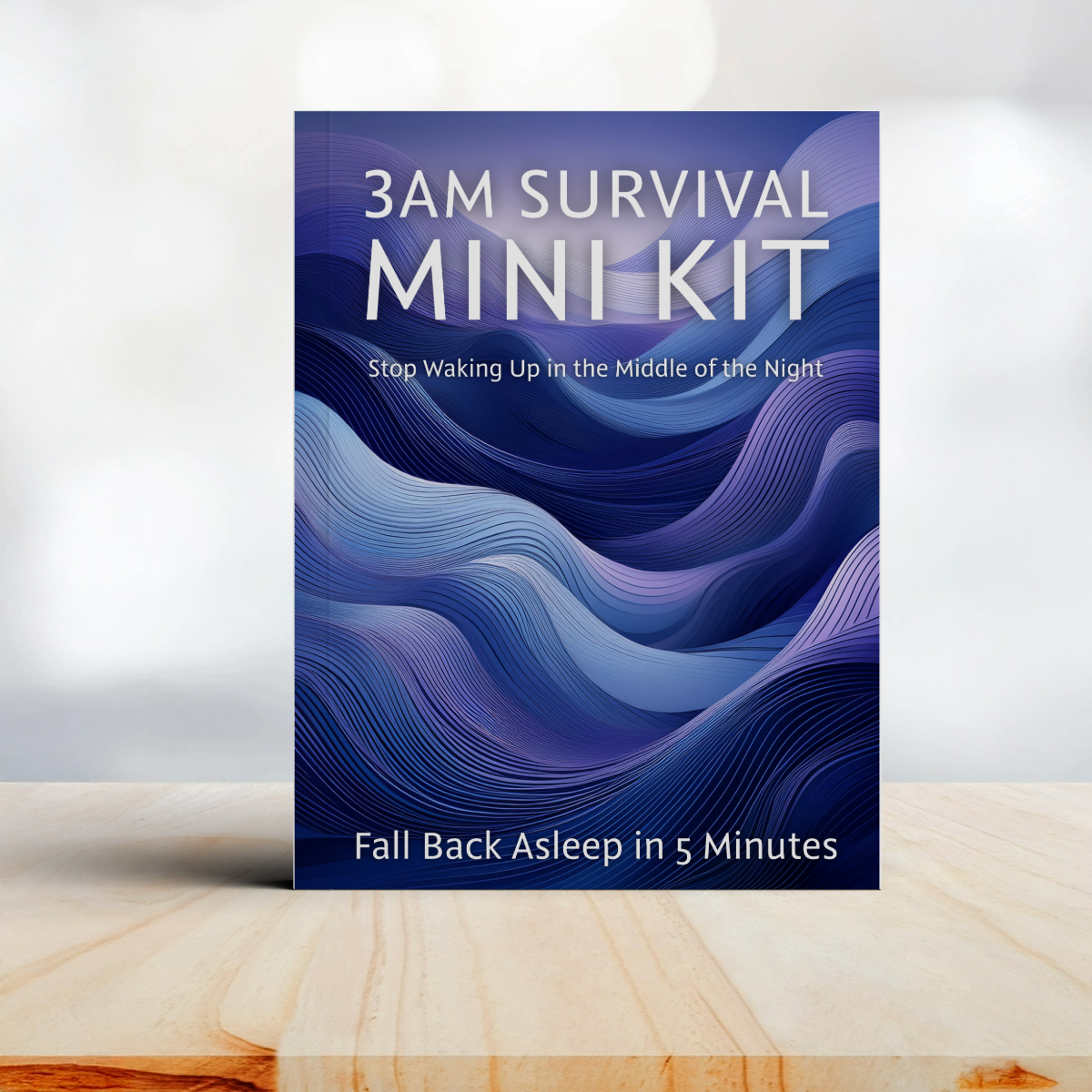How Fasting Affects Your Sleep: Balancing Intermittent Fasting and Circadian Rhythms
Published on July 17, 2025

Understanding Intermittent Fasting and Circadian Rhythms
Intermittent fasting (IF) is more than a wellness trend; it reflects the deep wisdom of aligning with the body’s circadian rhythms. Our circadian clock regulates not only sleep and wakefulness, but also hormone secretion, digestion, body temperature, and even mood. When we synchronize eating habits with natural light-dark cycles, we can positively influence both metabolism and sleep quality.
Why Timing Matters
Research shows that when we eat can be just as important as what we eat. By aligning meals with daylight hours, we help the body maintain clear signals between daytime alertness and nighttime rest. Eating late in the evening disrupts this signaling, leaving the body metabolically active when it should be winding down.
Key Insights:
- Aligning Meal Times: Restricting food intake to earlier in the day reinforces circadian signals. The digestive system is most efficient in daylight hours, and finishing meals earlier allows the body to prioritize repair and rest at night.
- Shift Workers and Night Eaters: Individuals with irregular eating patterns, such as shift workers, often experience fragmented sleep and higher risks of metabolic disorders.
From a traditional Chinese medicine (TCM) perspective, late-night eating overstimulates the stomach and liver meridians, disturbing the Yin–Yang balance necessary for deep, restorative sleep.

The Impact of Late Eating on Rest

3AM Survival Mini Kit
Fall Back Asleep in 5 Minutes
A clear, no-nonsense guide that tells you exactly why you wake up at 3AM and what to do the moment it happens — so you can stop the adrenaline spike, calm your body, and fall back asleep within minutes. Every step is practical and designed to fix the problem right when it starts.
See What’s Inside – $4Late-night meals can delay the release of melatonin—the hormone that signals it is time for sleep. Instead of entering a calm Yin state, the body stays in Yang activity mode: digesting, producing insulin, and raising body temperature.
- Delaying Sleep: Heavy dinners near bedtime extend the time it takes to fall asleep.
- Sleep Fragmentation: Digestion during the night can lead to micro-awakenings, restlessness, and lighter, less restorative sleep.
- Hormonal Chaos: Elevated insulin late at night affects cortisol and can trigger midnight awakenings.
Practical Advice: Have your last meal 2–3 hours before bed. Choose light options that support Yin energy, such as vegetable soups, steamed fish, or warm porridges with calming herbs like fennel or chamomile.
TCM Insight: The liver performs its detoxification peak between 1–3AM. Heavy or greasy food in the evening may overload the liver and cause awakenings during this “liver time.”
Blood Sugar and Sleep Stability
Stable blood sugar is one of the most overlooked aspects of sleep quality. Sharp fluctuations can trigger adrenaline surges that wake you at 3AM—a phenomenon confirmed in sleep labs and explained in depth in the 3AM Survival Kit.
- Fasting and Insulin Sensitivity: Intermittent fasting improves insulin sensitivity, reducing the frequency of blood sugar spikes and crashes.
- Nighttime Stability: Avoiding late sugar and alcohol minimizes sudden nocturnal drops that jolt the nervous system awake.
Practical Strategies:
- Opt for a protein-rich dinner (lentils, fish, or tofu) with slow-digesting carbs.
- Limit stimulants and refined sugar after 5PM.
- Herbal teas like lemon balm, lavender, or passionflower can support calm blood sugar and nervous system balance.
A Personal Journey with Fasting
During my burnout years, I was plagued with restless nights. In desperation, I adopted a 16:8 intermittent fasting rhythm (eating between 10AM–6PM). Within weeks, the change was profound. My energy returned during the day, and at night I drifted into deep, uninterrupted sleep.
One of my clients, Sarah—a lifelong night owl—also experimented with earlier eating windows. To her surprise, she stopped waking at 3AM. She described the effect as “unlocking a natural sedative that was always inside me.”
This highlights an important truth: sometimes the body doesn’t need more supplements or medications—just a return to rhythm.
What Studies Reveal
A growing body of research supports the fasting-sleep connection:
- A 2022 Sleep Medicine Journal study showed 20% improvement in sleep quality among intermittent fasting participants, including faster sleep onset and deeper non-REM sleep.
- Fasting positively impacts cortisol and melatonin regulation, helping balance hormones essential for sleep stability.
- Clinical trials link fasting with reduced sleep apnea risk and fewer night awakenings.
From a holistic viewpoint, fasting creates more Yin space for the body: less energy spent on digestion, more reserved for repair, detoxification, and dream states (which in TCM are tied to Shen—the spirit housed in the heart).
Evening Rituals and Light Suppression
Fasting alone isn’t enough if evenings are filled with blue light and mental overstimulation. Combining IF with mindful sleep hygiene enhances its effects:
- Dim Lights Early: Mimic sunset by reducing brightness and shifting to warmer tones.
- Evening Wind-Down: Try aromatherapy with lavender or cedarwood essential oil in a diffuser—both calm the heart and Shen.
- Digital Detox: No screens 1 hour before bed. Replace scrolling with journaling or mindful breathing.
- Gentle Movement: Practices like Qi Gong or yoga stretches help Yang energy descend, preparing Yin for rest.
Best Practices for Fasting and Sleep
Here’s a table comparing supportive vs. disruptive practices:
| Supportive Habits | Disruptive Habits |
|---|---|
| Eating with daylight | Eating heavy meals at 9–10PM |
| Herbal teas (chamomile, lemon balm) | Alcohol or sugary desserts before bed |
| Gentle evening stretches | Intense workouts late at night |
| Consistent sleep & meal times | Erratic eating and sleeping schedules |
| Light vegetable-based dinners | Fried, spicy, or greasy late meals |
Aromatherapy & Acupressure Add-Ons
Drawing on TCM and aromatherapy, you can complement fasting with calming rituals:
- Essential Oils: Lavender for calming Yin, sandalwood for grounding Yang, and ylang-ylang for easing nervous agitation.
- Acupressure: Stimulate Shenmen (HT7) to calm the mind, or Neiguan (PC6) to ease anxiety and digestion-related sleep issues. You can explore more in our free guide Acupressure for Better Sleep.
These practices support the same goal: allowing the Yang to retreat and the Yin to dominate at night.
Intermittent Fasting and Lucid Dreaming
Interestingly, some practitioners report more vivid dreams during fasting periods. Reduced digestive load seems to deepen REM sleep, creating fertile ground for lucid dreaming. For those interested in conscious dreaming practices, fasting may not only heal sleep but also expand awareness in dream states.
Final Thoughts
Intermittent fasting, when practiced in alignment with circadian rhythms, offers a powerful synergy: metabolic health during the day and restorative, uninterrupted sleep at night.
By combining fasting with light evening meals, mindful rituals, and ancient wisdom from TCM, you can create conditions for sleep that is not only restful but deeply healing.
Key Takeaways:
- Finish eating earlier to support melatonin production.
- Use fasting to stabilize blood sugar and prevent 3AM wake-ups.
- Support Yin with calming teas, aromatherapy, and acupressure.
- Treat evenings as sacred—dim lights, release stress, and prepare for deep rest.
For further exploration, try our tools:
- Sleep Test to discover your sleep profile.
- Sleep Cycle Calculator to plan optimal bedtimes.
- Sleep Tips & Gentle Strategies for a daily checklist.
And if 3AM wake-ups are your biggest challenge, explore the 3AM Survival Kit—your practical guide to navigating and preventing those fragile hours.
Sleep, like fasting, is a rhythm. Honor it, and it will reward you with energy, clarity, and peace.
Frequently Asked Questions
Martin Lain — Sleep Researcher & Creator of SleepCureAI
Martin Lain combines modern sleep science, circadian-rhythm research, TCM-inspired insights, and AI-based pattern analysis to help people understand their sleep more deeply. His work integrates gentle nighttime rituals, nervous system regulation, and data-driven tools.
Medically Reviewed by
Dr. Mei Lin, DACM – TCM Sleep Medicine Specialist
(Editorial Medical Reviewer Persona)
Dr. Mei Lin is an editorial medical reviewer specializing in Traditional Chinese Medicine. Her expertise focuses on the relationship between Yin–Yang balance, Shen (Heart spirit), Liver Qi regulation, and the Kidney's role in nighttime restoration. Her review ensures that SleepCureAI articles align with foundational TCM sleep principles and classical physiological patterns described in traditional sources.
- Yin deficiency and difficulty sleeping
- Liver Qi stagnation and 1–3AM wake-ups
- Kidney Yin and nighttime restoration
This reviewer profile represents an editorial medical persona used for accuracy review of TCM-related sleep concepts.
Reviewed by SleepCureAI Sleep Engine (Beta)
A machine-learning model trained on circadian rhythm science, Traditional Chinese Medicine sleep physiology, and behavioral sleep optimization frameworks. This system reviews each article for timing accuracy, emotional–physiological coherence, and alignment with safe sleep practices.
- Circadian rhythm consistency
- Nervous system safety & regulation insights
- TCM coherence (Yin–Yang, Liver Qi, Shen)
- Evidence-based lifestyle recommendations
Disclaimer: This AI system does not diagnose medical conditions and does not replace professional care.